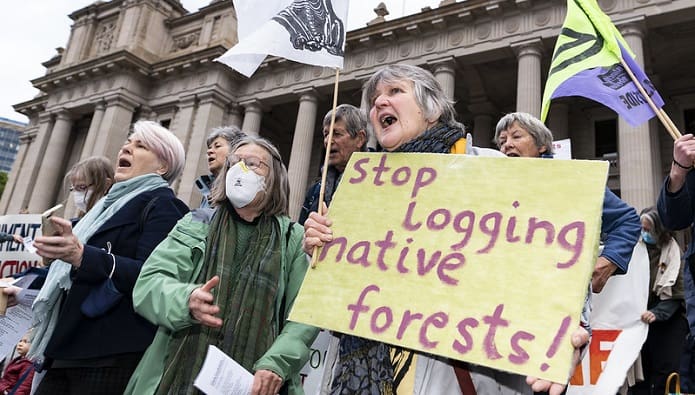Under pressure from the timber workers’ union, Victorian Labor has passed a law targeting environmental activists. But other unions pushed back against this move, calling it an attack on the right to protest.
The law strengthens penalties for hindering, obstructing or interfering with timber harvesting operations to $21,000 in fines and to jail sentences of up to 12 months.
Labor strengthened the penalties to address the grievances of the manufacturing section of the CFMMEU, which covers timber workers. The union was angered by Labor’s 2019 law that strengthened the compliance and enforcement of environmental laws in the forestry industry.
The 2019 legislation was introduced as a reaction to the industry’s ongoing violation of environmental regulations—a fact documented and brought to light by the environmental activists who are now at risk of new penalties.
By further criminalising civil disobedience, Victorian Labor is following in the footsteps of the NSW Liberal Party, which in response to Blockade Australia actions recently passed laws that will see people fined up to $22,000 or imprisoned for two years if they protest on public roads, rail lines, tunnels, bridges or industrial estates.
Three years ago, in response to actions by Extinction Rebellion, the Queensland Labor government introduced a ban on protesters using locking devices, criminalising peaceful protest that involves blocking roads or buildings.
All these laws against protest should be scrapped.
Disruptive
Victorian Greens leader Samantha Ratnam spoke out against the latest legislation, pointing out that disruptive protests were an essential part of successful environmental campaigns.
“The reality is, without activists, protesters, and environmental defenders, the Franklin River would be dammed and the Tasmanian wilderness drowned. The Daintree Rainforest would no longer exist and Kakadu wouldn’t be a place to visit to marvel at our natural world.”
One day before the passage of the bill, about 100 environmental protesters gathered outside Parliament to voice their opposition. Thirteen environmental groups including Friends of the Earth, Victorian Forests Alliance and the various branches of Extinction Rebellion co-hosted the event.
Protesters cheered as the chair read out that their open letter against the bill was signed by the Victorian branches of the Maritime Union of Australia, the United Workers Union and Australian Services Union (Private Sector Division and Authorities and Services Division).
The letter which was addressed to Premier Daniel Andrews argued: “Any stripping away of the right to protest eventually finds its way to further limiting workplace action. Already Australia has some of the most restrictive laws around industrial action in the world.
“In the context of a climate crisis, the right to protest must be advanced not diminished.”
The open letter shows that environmental activists and unions have a common interest in standing up to attacks on the environment as well as on our right to protest.
It demonstrates that by gaining support within the unions, environmental activists don’t have to choose between opposing Labor policy and alienating workers.
The successful campaigns that Ratnam referred to won because civil disobedience like blockades and sit-ins gained broader community and union support.
Just transitions
Like in other places around the world, Victoria’s native plant and animal life such as the Leadbeater’s possum are being pushed to the brink of extinction, as climate change-induced bushfires destroy their native habitats faster than they can recover. The continued logging of native forests only makes things worse.
In response to pressure from environmental activists, VicForests, the government-owned enterprise that manages the logging industry, will begin phasing out native forest logging by 2024 and will end operations by 2030.
The Victorian government has set aside $200 million to support the transition. However, only part of this package will help workers and communities, with workers receiving retraining but no guarantee of a job. Workers will also get limited top-ups on their redundancy payments and a potential relocation allowance if they leave their community.
Compounding this problem is that most forestry and timber manufacturing jobs are in Gippsland, the region which will also see its coal-fired power stations close over the next 15 years.
Unions and the environment movement have a common interest in demanding that state and federal governments set up a just transition program with real funding and power that guarantees jobs for displaced workers.
It should coordinate the transition away from both timber and coal industries with the creation of new public sector jobs with comparable wages and union rights, provision of quality training and education, and the guarantee of essential services for workers and communities affected by the transition.
By a CPSU member





